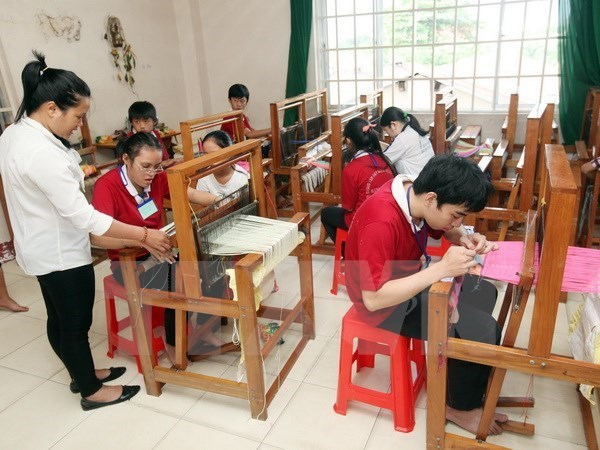People with disabilities need exclusive source of low-cost loans
Millions of working-age people with disabilities who have the ability to work are in need of help to access soft loans to pursue vocational training and employment.
 Vocational training for people with disabilities (Photo: VNA)
Vocational training for people with disabilities (Photo: VNA)Hanoi (VNA) – Millions of working-age people with disabilities who have the ability to work are in need of help to access soft loans to pursue vocational training and employment but there is an absence of a source of soft loans exclusively designed for them.
The problem was brought to light at a workshop on policy and credit solutions to develop vocational training and employment for persons with disabilities and promote their products in Hanoi on April 12. The workshop was co-held by the Ministry of Labour, Invalids and Social Affairs (MoLISA) and Vietnam Bank for Social Policies (VBSP).
Statistics by the MoLISa show that Vietnam is home to about 8 million people with disabilities aged above 5 years old, most of whom (87.2 percent) are living in rural areas. Of the disabled population, some 65 percent are at working age; about 40 percent have the ability to work; but only 30 percent are actually working to earn a living for themselves and their families.
Dinh Thi Quynh Nga, a disabled woman and director of a Hanoi-based handicraft cooperative which employs dozens of workers with disabilities, said the workers there have acquired necessary working skills but they all experience financial difficulties.
“People with disabilities who want to take part in the cooperative must make a contribution to the charter capital, but all of them are living under difficult circumstances and dependent on their family,” she said, adding that it is the reason why it is hard for the cooperative to expand.
The VBSP is providing people with disabilities and businesses who employ people with disabilities with loans sourced by the National Fund for Job Assistance and the Nippon Foundation of Japan but there is yet a source of low-cost loans exclusively designed for people with disabilities, said MoLISA Deputy Minister Le Tan Dung.
Echoing Dung’s view, VBSP Deputy Director General Nguyen Van Ly noted that there is an absence of a special mechanism to give soft loans to people with disabilities; as a result, very few people were able to access low-cost loans.
The VBSP reported that last year, the banks offered soft loans to four new projects employing a large number of persons with disabilities and some 2,360 projects run by persons with disabilities, which provide employment to a total of 2,540 people with disabilities. Its disabled clients were estimated at more than 11,000 people.
Ly suggested the government to review legal documents on people with disabilities, increase annual funding for the National Fund for Job Assistance and set up a special fund providing low-cost loans to people with disabilities and employers of people with disabilities.
He also advised the local governments to allocate funding for such type of loans and closely work with the VBSP to improve the quality of social quality credit services for disabled people.-VNA













